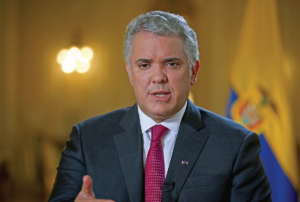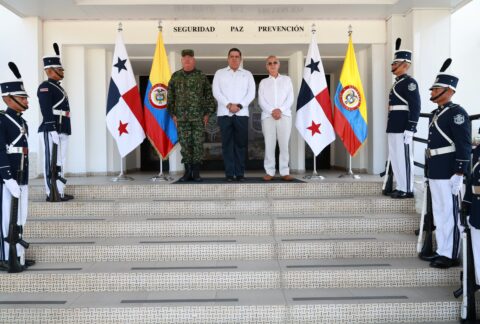Colombia has confronted the global problem of drugs throughout its history, as it became the main threat to public order, to the country’s political stability, to national security, and to the rule of law itself.
For more than 40 years, the fight against this scourge has been relentless, and we have fought tirelessly against all the links of this transnational criminal chain, together with the Military Forces and the National Police and through international cooperation mechanisms.
These mechanisms are a fundamental tool, which works through partnerships with countries that share common interests — in this case, the fight against narcotrafficking. The triangular cooperation with the United States in Central America embodies the commitment to exchanging experiences and good practices. Projects such as the U.S.-Colombia Action Plan (USCAP) and those of the U.S. Department of State’s Bureau of International Narcotics and Law Enforcement Affairs (INL) have been effective in training military and police forces from other countries in the region, based on the Colombian Public Force’s expertise.
In addition, the international naval campaign Orion to combat narcotrafficking — its sixth edition was carried out September 15-October 30, 2020 — is an international cooperation agreement among 29 countries, 51 international institutions, and six Colombian institutions, to disrupt the activities of transnational crime organizations. In its sixth edition, Orion seized 90.7 tons of cocaine hydrochloride, 18.6 tons of marijuana, and 3.5 kilograms of heroin; destroyed 168 facilities for illegal drug production; and captured 413 people involved in these activities.
War against drugs

Colombian President Iván Duque made the war against drugs one of the priorities of his administration. At first, it seemed impossible to eradicate the more than 170,000 hectares of coca crops, but what was unacceptable was to allow organized armed groups and microtrafficking gangs to take over our territory to perpetrate crimes. This is how in 2018 crop growth began to slow down, and in 2019 we were already looking at a 9 percent reduction in planted area.
Continuing with this struggle, in 2020 we eradicated 130,000 hectares of coca crops, a historic figure that is not a mere number, but rather represents more security for the country. We gave Colombians a territory less contaminated with illicit crops, dealing a significant economic blow to narcotrafficking organizations.
Despite the presence of criminal groups with international tentacles, remnant organized armed groups, and other organizations that get their revenue from this scourge, the seizure of cocaine hydrochloride represented another historic figure in 2020, with 498 tons. Authorities also seized 545 tons of coca leaf, 63 tons of cocaine base, and 515 tons of marijuana.
More security for the population
With these results, the Colombian population enjoys greater security today. We have reduced the murder rate by 5 percent (which is not just a figure, but rather reflects that we have prevented violence from claiming more than half a million lives), extortion has also declined by 10 percent, theft has dropped in all its forms, and sexual offenses have decreased by 26 percent.
Maintaining our unconditional commitment to the country, we handled the greatest humanitarian emergency that we have ever faced, caused by Hurricane Iota in San Andrés and Providencia, where our forces fulfilled their duty to protect the population in the disaster’s aftermath, tending to the needs that arose and also devising an ambitious plan to rebuild the archipelago.
These results show that the fight against narcotrafficking organizations has not been in vain, and that the work of the Military Forces and the National Police has been satisfactory, as have the partnerships that as a State we have created, to halt the growth of these illicit financing practices that only generate violence and corruption, and stall the country’s development.
In the same vein, the achievements obtained predict that 2021 will yield better results; although it seems difficult, the strength of our Public Force and its capabilities to confront great challenges are evident. Therefore, we maintain certain goals, such as seizing an additional 500 tons of cocaine hydrochloride and eradicating another 130,000 hectares of illicit crops, but this time considering the option of resuming aerial spraying — an effective mechanism in this fight, since manual eradication has cost the lives of soldiers, police officers, and civilians.
As an institution, we will be more environmentally conscious, continuing with strategies that stop deforestation, such as Operation Artemis, and hitting all the structures that engage in the illegal expansion of agricultural land and in illegal mining, goals proposed by the national government. Concerning criminal groups or organizations, operations are already under way to capture the leaders of these illegal groups.
We thank beforehand the nations that have placed their trust in the Colombian State to maintain the joint work against drugs; to our service members and police officers, we reiterate our pride in their impeccable effort in this fight, and in their excellent attitude of service to our fellow citizens. The country is grateful to you, and history will recognize you.









